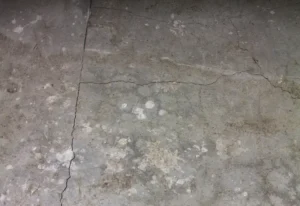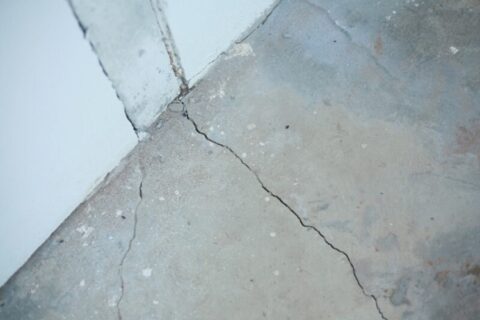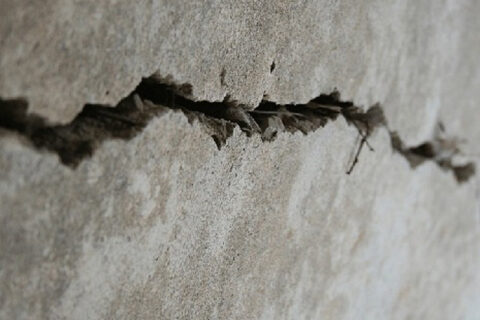Causes Fixes for Basement Floor Cracks in the Milwaukee, WI Area
 Basement floor cracks are a homeowner’s nightmare. They don’t just make your basement look unkempt and run-down; they can lead to costly repairs if ignored. Fortunately, not all cracked basement floors are signs of major structural issues. While some signal bigger problems, others are harmless and easily fixed. Understanding what causes basement floor cracks in Milwaukee, WI and how to fix them is essential if you want to maintain your home’s value and avoid unexpected expenses. Everdry Waterproofing of Wisconsin is here to explain everything you need to know, from identifying the causes of these cracks to implementing effective solutions.
Basement floor cracks are a homeowner’s nightmare. They don’t just make your basement look unkempt and run-down; they can lead to costly repairs if ignored. Fortunately, not all cracked basement floors are signs of major structural issues. While some signal bigger problems, others are harmless and easily fixed. Understanding what causes basement floor cracks in Milwaukee, WI and how to fix them is essential if you want to maintain your home’s value and avoid unexpected expenses. Everdry Waterproofing of Wisconsin is here to explain everything you need to know, from identifying the causes of these cracks to implementing effective solutions.
What Causes Basement Floor Cracks?
Cracks in your basement floor can appear for a variety of reasons. Here’s a breakdown of the most common causes and how they can affect your home:
Shrinkage
Freshly-poured concrete contains a fair amount of water. As the concrete dries (or cures), the water evaporates, causing the material to shrink. This natural shrinkage often leads to small, harmless cracks. These hairline cracks are usually just cosmetic and not cause for concern. However, bigger cracks are possible, and these will require professional assistance. If you notice significant cracks due to shrinking, we may be able to control their spread with a concrete crack injection material.
Settling Soil
After a house is built, the soil beneath the foundation can compress or shift. When this happens, the unsupported concrete slab may crack as it adjusts to the new pressure or void below. This type of crack typically runs in a straight line or follows a pattern, and most of the time, they’re wider than hairline cracks. A cracked basement floor due to settling soil is cause for concern, especially if you notice uneven floor levels and other foundation issues.
Pressure From Groundwater
If the soil around your home is saturated with water, it creates hydrostatic pressure. This pressure pushes up against the bottom of your basement slab, causing it to crack. Large cracks in your floor, water seepage, and water puddles can all point to too much hydrostatic pressure. We highly encourage taking care of these kinds of cracks right away. Water infiltration can lead to mold growth, damage to belongings, and even health concerns. Talk to us about basement waterproofing as soon as possible.
Tree Roots
When we think of trees damaging our homes, we often think of falling branches harming our roofs and siding. However, tree roots can also become a problem. As they grow, they may begin to push against your foundation, eventually leading to a cracked basement floor. Cracks from tree roots most often occur near exterior walls or corners. If you notice damage in these areas, it’s critical to act right away to prevent further damage.
Freeze-Thaw Cycles
If your basement isn’t properly insulated, seasonal temperature changes can cause the water in and around your concrete to freeze and expand. Over time, this freeze-thaw cycle can wreak havoc on your basement floor. Cracks that worsen in colder months or flaking chunks of concrete are both cause for concern. Because freeze-thaw damage can weaken the structural integrity of your home, we encourage calling for basement floor repair as soon as possible.
How to Fix Cracks in a Basement Floor
Fixing cracks in basement floors is our specialty at Everdry Waterproofing of Wisconsin. We have repair down to a science and use a tried-and-true process to bring you an effective fix. Our team will tailor this general process to your property’s unique needs:
1. Determining Severity
Before we seal cracks in a basement floor, we’ll assess the size and severity of the crack. Depending on what we find, we may measure the existing cracks and monitor them over time. For cracks wider than 1/8”, we’ll prioritize repair. Call a professional right away if cracks are accompanied by:
- Water damage
- Mold growth
- Uneven floors
- Bowing walls
2. Cleaning the Cracks
Next, our team will clean each crack thoroughly with specialized tools. By removing dirt and debris, the repair materials will better adhere to the remaining concrete.
3. Sealing Basement Floor Cracks
For hairline cracks, the repair process is fairly simple. Our team will take care of sealing basement floor cracks by applying patching material, smoothing it out, and waiting for it to fully dry. Soon enough, you’ll have a pristine basement floor!
4. Repairing Larger Cracks
Sometimes, larger cracks require more robust solutions than sealing. For example, polyurethane injections or hydraulic cement may be effective. After we’ve assessed your floor’s condition, we can recommend which material is best for your situation.
5. Addressing Water Problems
If a crack occurs because of hydrostatic pressure or water seepage, sealing alone won’t solve the problem. Our team will recommend additional solutions, such as installing a sump pump, improving exterior drainage, or interior waterproofing to avoid future issues.
6. Solving Underlying Issues
Cracks in concrete basement floors are often the result of deeper problems. Fixing the crack is important, but addressing the root cause is critical to preventing further damage. Depending on your circumstances, we may recommend one of these solutions:
- If soil settling is the culprit, consider underpinning to stabilize your foundation.
- For tree root issues, consult an arborist to trim or remove problem roots.
- Insulate your basement to reduce damage caused by freeze-thaw cycles.
Our Tips to Prevent Future Basement Cracks
Everdry Waterproofing of Wisconsin is here for you when you’re dealing with cracks or a heaving basement floor. But we can all agree that prevention is best when it comes to foundation issues. Here are a few ways to minimize your risk of cracked concrete floors:
- Maintain Proper Drainage—Keep gutters and downspouts clean to prevent water from pooling around your foundation.
- Control Humidity Levels—Use a dehumidifier to reduce moisture in the basement.
- Monitor Trees Near Your Home—Plant trees at least 15 feet away from the foundation to avoid root interference.
- Inspect Your Basement Regularly—Walk through your basement every few months to identify any new cracks. Catching them early could mean a smoother repair process.
Protect Your Basement and Your Home
Cracks are often easily fixed as long as you call for professional help right away. The team at Everdry Waterproofing of Wisconsin is proud to offer outstanding services to homeowners throughout the Milwaukee area, and we’d be glad to help you as well. Contact us today for details about our basement waterproofing and foundation repair services.
Ready to Get Started?
Contact Us Today to Schedule a No Pressure, No Obligation, Free Quote!


